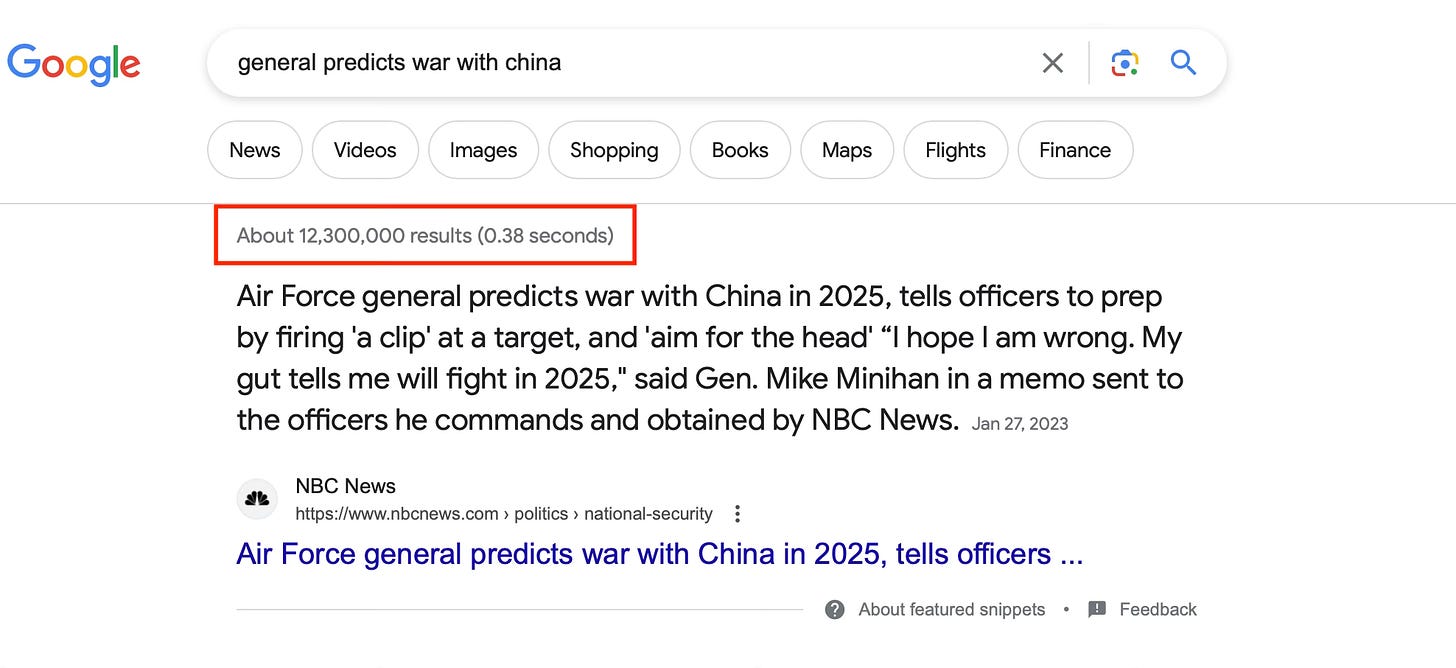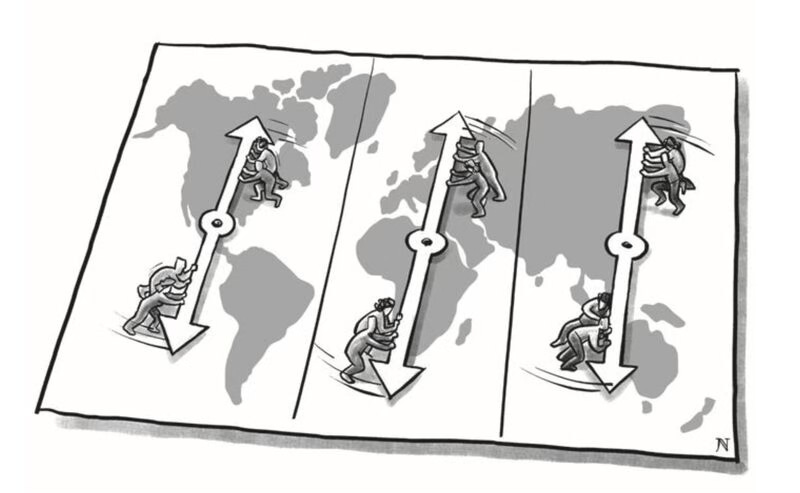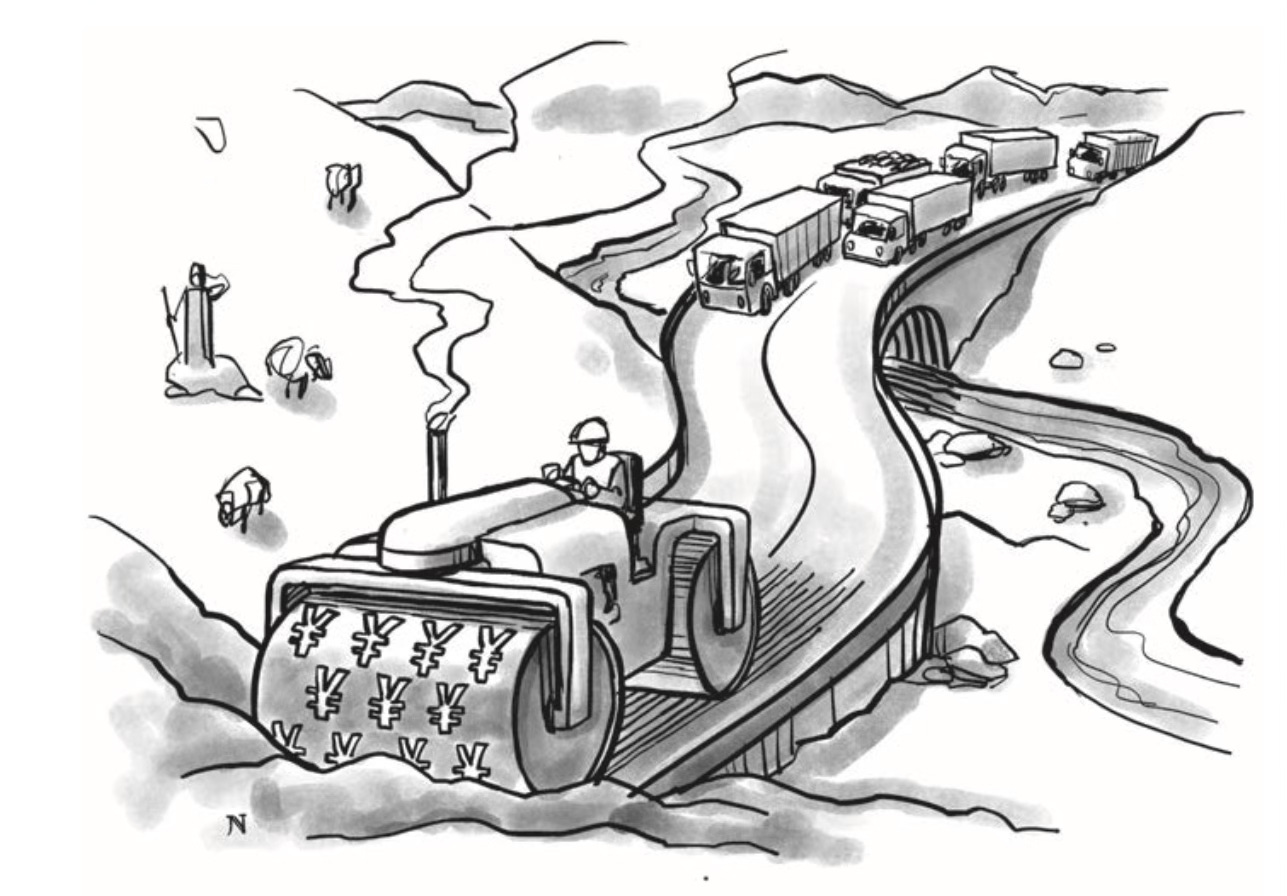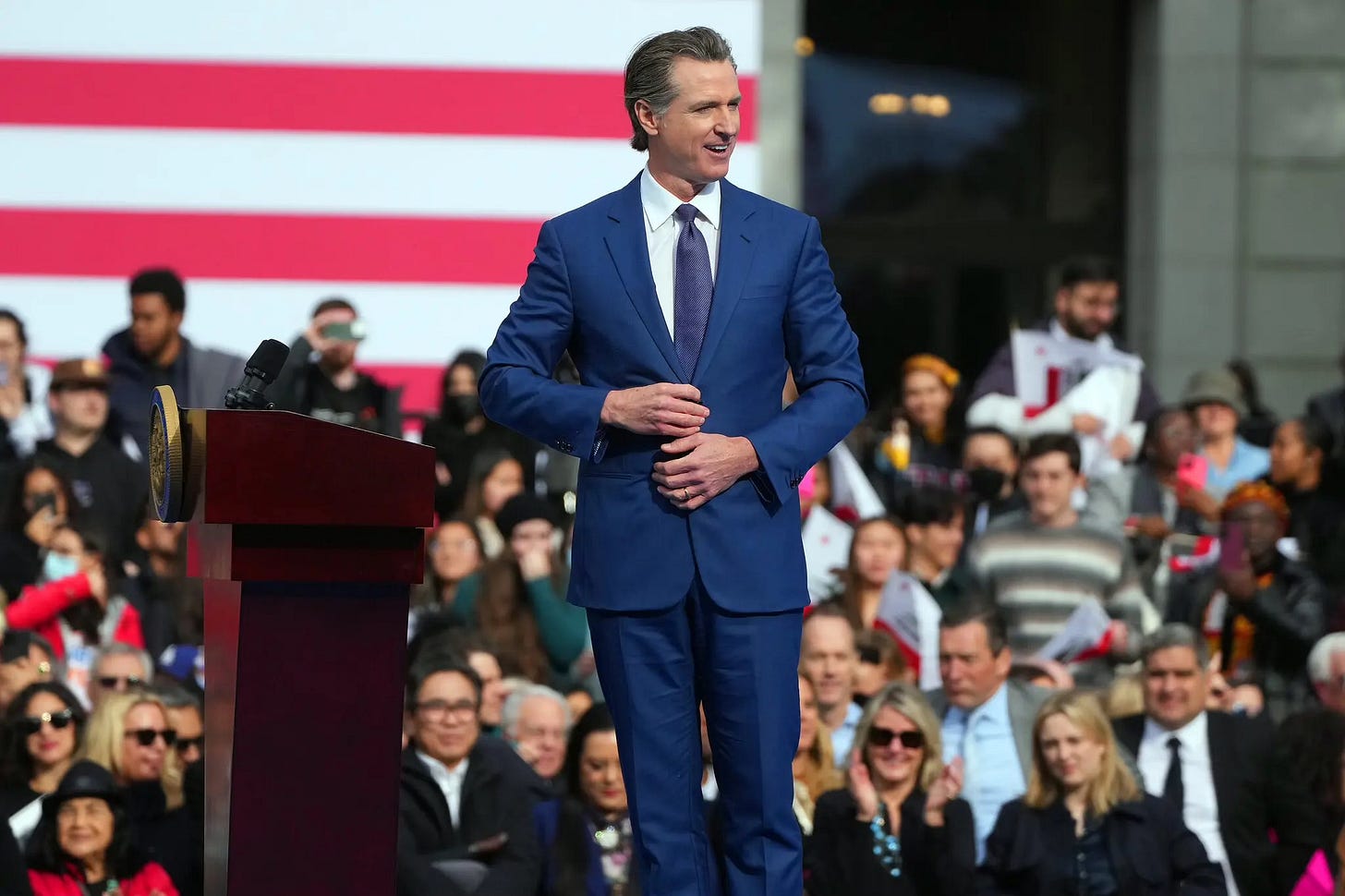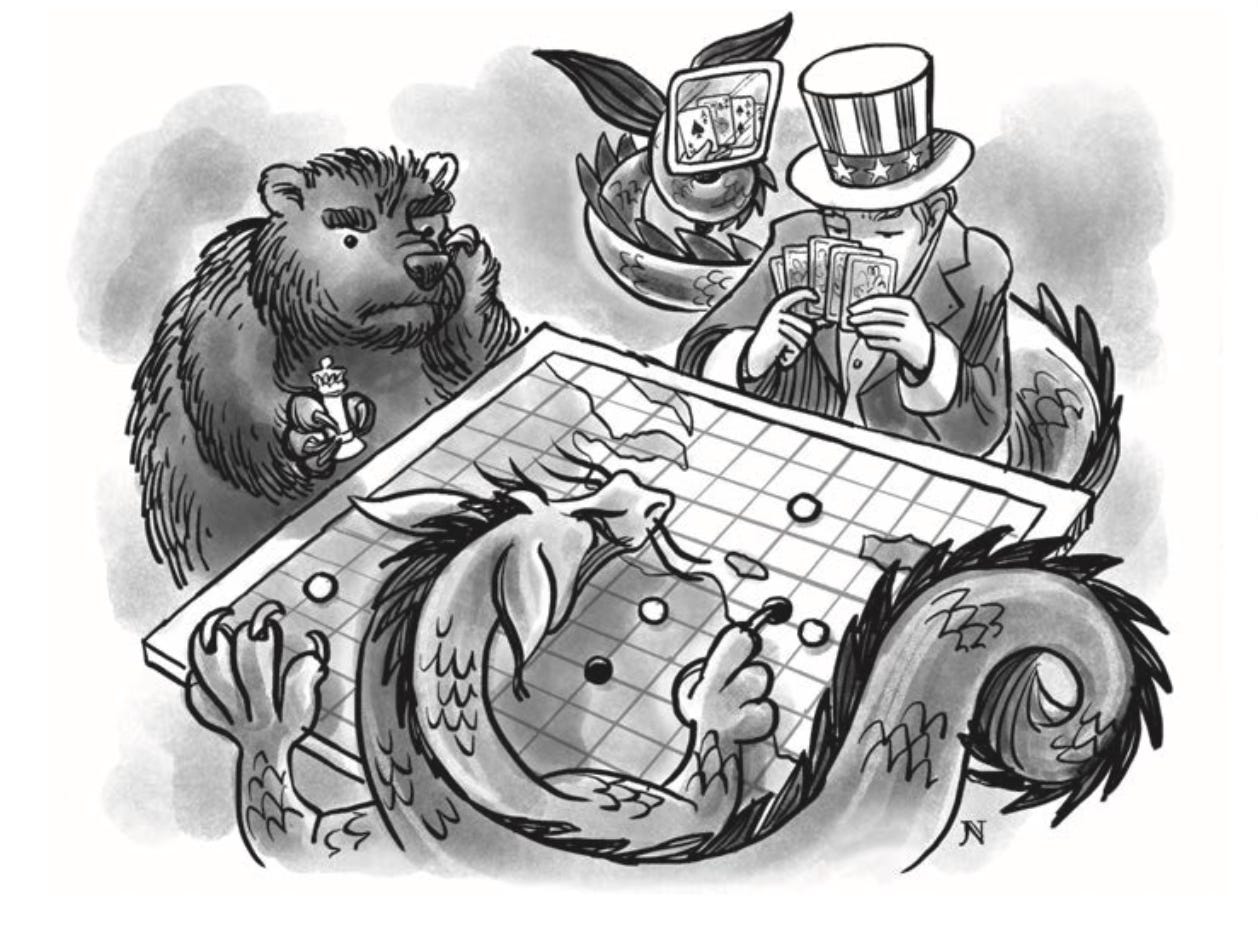I live on headlines. When you aspire to be an expert on globalization, as I do, then everything under the sun is of interest to you.
Right now the headlines are all War! War! War!
There’s Russia-v-Ukraine.
But also Israel-v-Hamas, with Iran as the latter’s not-so-silent partner.
And US flag officers are regularly teeing up Taiwan+US-v-China, some of them literally providing expiration dates.
We can’t forget North Korea either.
So, naturally, we’re being inundated with visions of a future dominated by war, with the most egregious projections (see Robert Gates) stacking China on top of Russia on top of Iran on top of North Korea, implying that kluged-together monster should be the Pentagon’s new force sizing principle. Surely our conflicted global future can be discerned amidst all these data points, right?
Me, I see nothing of the future in any of this.
Russia invades Ukraine to prevent its defection to the West. Moscow is losing the superpower brand war to Europe and is reduced to taking hostages in the form of various “breakaway republics” falsely manufactured at the barrel of a gun. This started with Transnistria a quarter century ago. Ukraine is a remnant of the Cold War: one of the last “kids” caught up in the custody battle between Europe and Russia. “Mom” is clearly winning, so “Dad” violently abducted the child.
What does that tell me about the future? Europe has a winning brand, Moscow does not — even when it involves its closest living “relative.” Russia has been losing this contest (glacially for decades and then all at once in 1989) since WWII.
What do I see in Israel?
I see a civil war between political haves (Israelis with a state) and have-nots (Palestinians without one). Given the existential hatred of the latter toward the former, I don’t see any good path out of this co-dependent relationship — unless Arab Sunni powers like KSA step up and own the Palestinian issue in such a way as to allow Israel to abdicate its long-dysfunctional role as keeper of the Palestinian fate.
Would such a resolution be possible if the Saudi-Emirati-Israeli alliance were allowed to solidify in its anti-Iranian purpose? I honestly believe yes, but that is but another good reason for Iran to blow up that project by turning Hamas and Hezbollah loose on Israel.
But do I see the future of the world here?
I do not.
I see an Israel-Palestine conflict that dates back to the aftermath of WWII, and a US-Iran rivalry now close to a half-century old but with grievances dating back to the 1950s.
How about China’s growing threat to Taiwan?
Also dates back to the immediate post-WWII era.
North Korea?
Ditto.
In sum, I spot a past-due date list of old conflicts that have persisted for decades — basically my entire life.
Meanwhile, US-style globalization has conquered the world, creating more wealth and development and reducing more poverty in those seven-plus decades than in the previous five centuries of European colonial rule.
Talk about your buried lede.
All of that progress has unfolded despite the grim persistence of these chronic struggles/conflicts/threats.
And it will continue to do so, meaning none of these separately or together automatically cast an existential threat on the US-constructed world order now dubbed globalization. They are simply long-standing troubles that defy easy resolution and inevitably suffer spiking.
Vision-wise, that’s the problem with organizing US foreign policy — much less our grand strategy — around this cluster of vestigial conflicts. Yes, we need to work them, arsenal of democracy-like and with appropriate strategic top-cover (deterrence), but their resolution does not constitute a vision of where we want to take America and the world. In sum, they constitute one big “wrong way” sign. Recognizing that sign still leaves us with the question of where to turn next.
Meanwhile, the biggest structural change that humanity has yet witnessed continues to unfold in the form of climate change, changing our East-West world into a North-South world.
Our superpower competitors China, Russia, and India all seem to recognize this shift, in addition to spotting the true nature of the competition triggered: Which superpower best addresses these tectonics? To include winning the hearts and minds (or maybe just stomachs and wallets) of a recently emerged global majority middle class whose center of gravity is found in that Global South?
Which political path (pluralism or autocracy) wins out across the global middle class will determine the tenor of the world system this century — to include its willingness and ability to deal with climate change as it ravages the South and remaps the North.
China is determinedly executing its Belt and Road Initiative across the Global South, and now shows a genuine willingness to adjust that strategy in the face of local and international pushback. The West delights in pointing out its shortfalls (and there are many) but only half-heartedly offers a competing vision — much less tangible counter-programming.
Understandable. I mean, America is busy working the bigger issues right now, like the bathroom rights of transgenders.
Meanwhile, Russia continues its security meddling across Africa and Latin America, and India primes itself to act as spokesperson of the Global South on development and climate change — a subject equally embraced by Beijing.
In sharp contrast, what we hear more out of the West right now are fears and complaints (and increasingly violent political rhetoric) about immigration from the Global South — a dynamic increasingly fueled by climate change and destined to drastically scale in the decades ahead. Yes, we lip-service plenty, but that’s the dominant vibe coming out of the West right now: Whatever your problems are in the South, stay the hell out of the West!
And we wonder why nobody in the South rushes to support us on Ukraine and Israel.
Again, none of these conflicts reflect or determine the future, while climate change does. So, despite their clustering right now (actually only a two-fer with the rest just anticipated), this era remains one in which the choice to lean-in on climate change as THE strategic factor shaping our nation’s and the world’s future makes good sense.
Want a negative example?
You remember the first GOP presidential primary debate when the first question was posed by a Millennial and it was all about climate change? What did we see? Eight candidates staring at the floor and the would-be Millennial avatar Ramaswamy raising his hand and yelling out “hoax!”

Little wonder Millennials and Gen Zs are skewing permanently to the left.
Want a positive example?
Check out California governor Gavin Newsome trying out his I’m-your-leader-on-climate-change presidential package. There’s a smart man who knows his generationally shifting electorate.
My bottom line is this: climate change is remapping the global playing board. America can continue to fixate on the players but it should really start playing that shifting board. That restructuring should receive our priority attention, even as we are forced to deal with all manner of residual flashpoints still left over from the Cold War.
Time to walk and chew gum at the same time, America.



